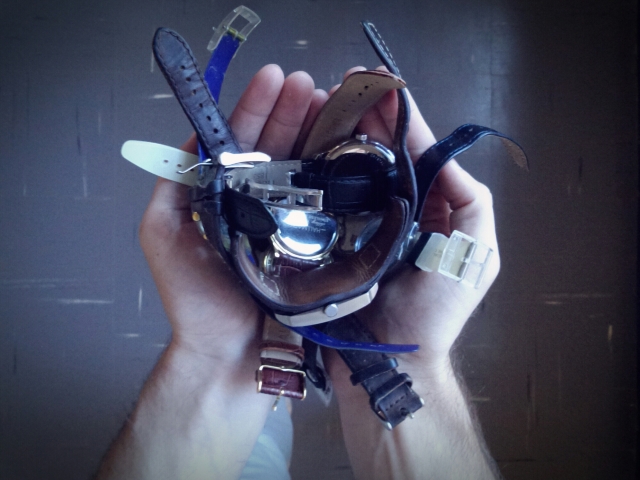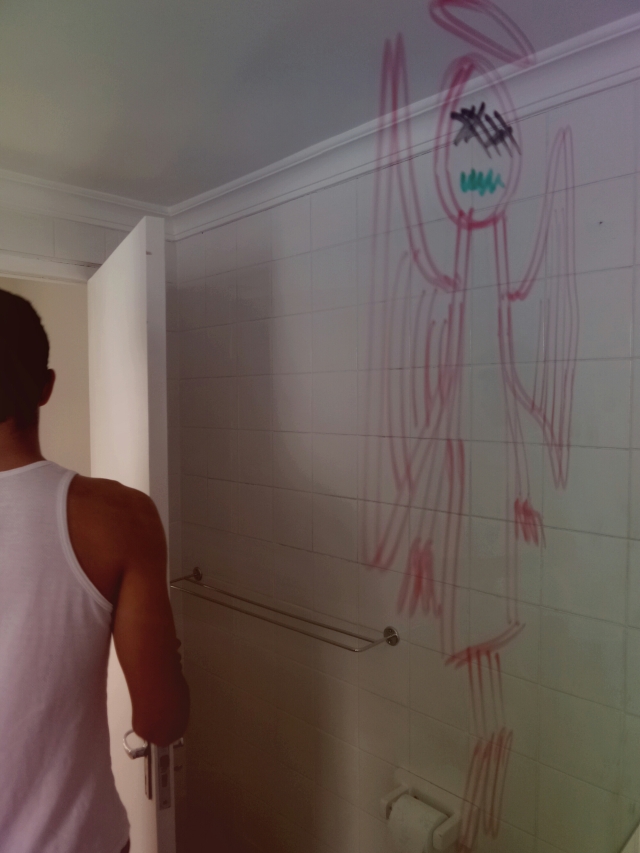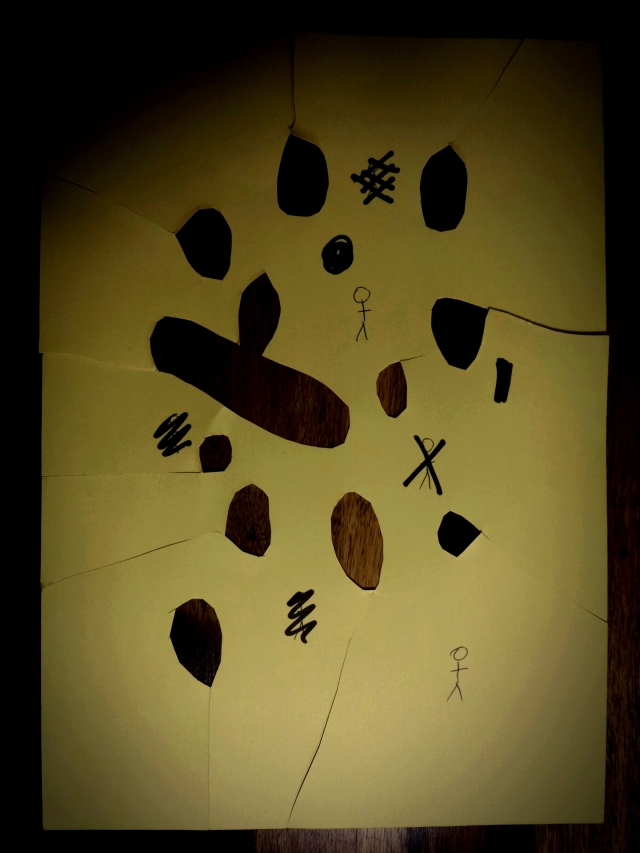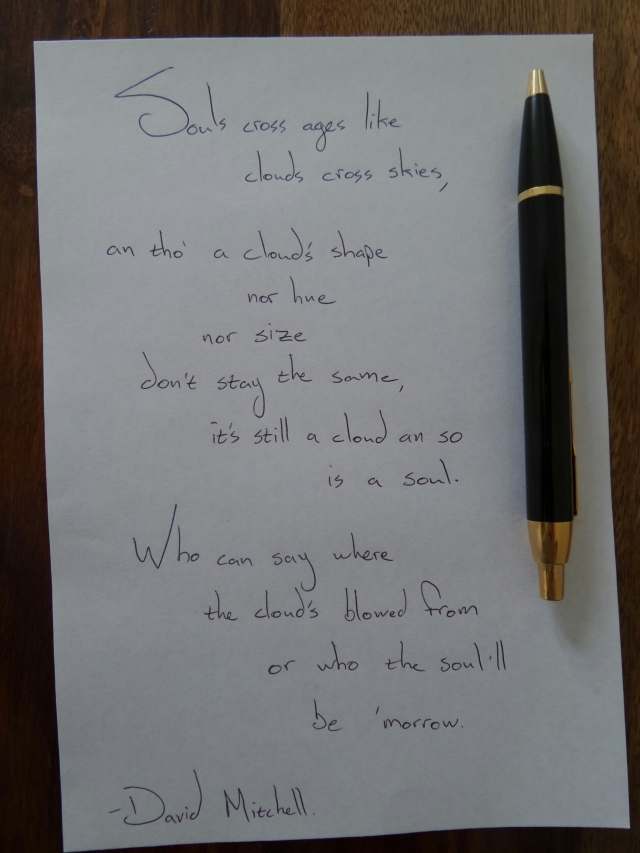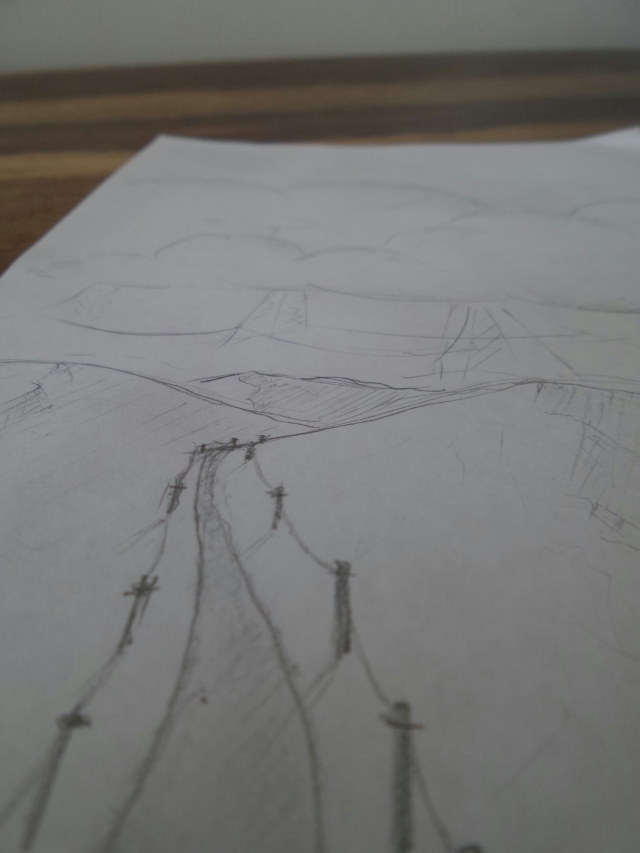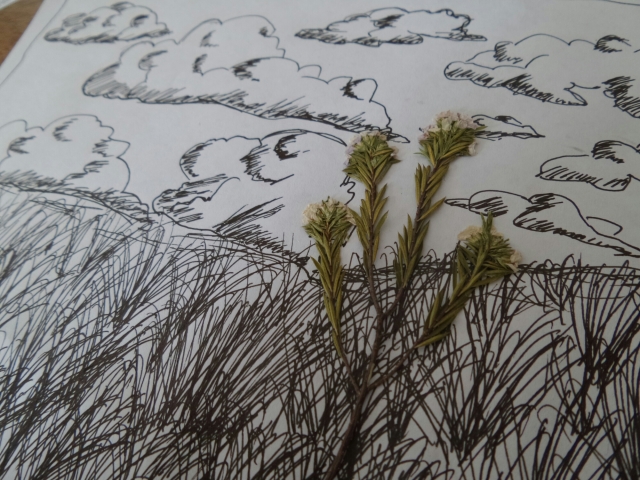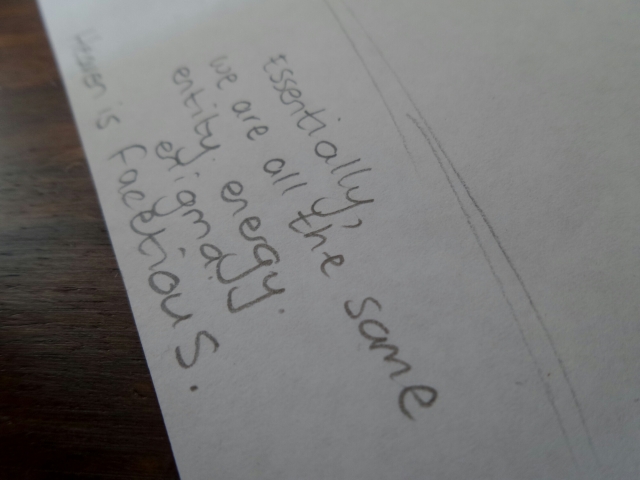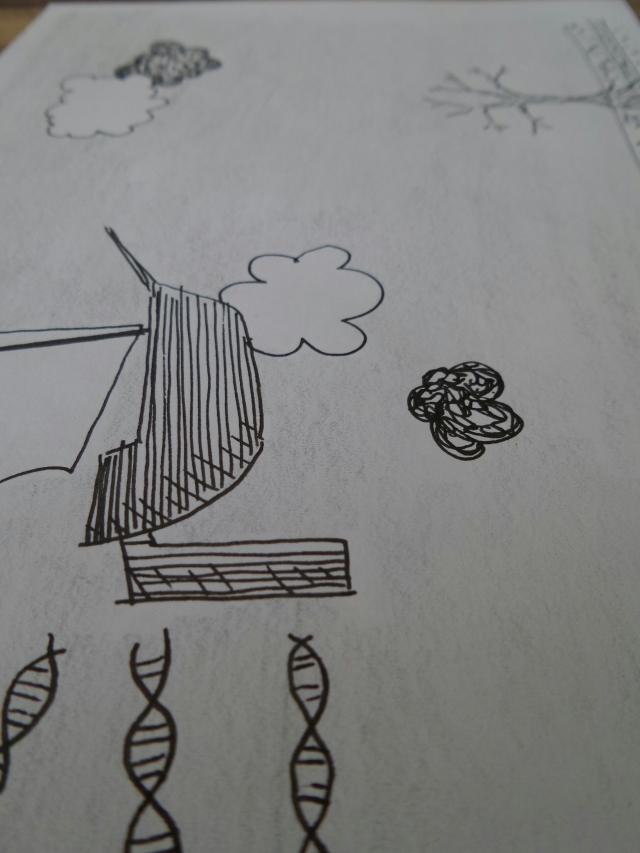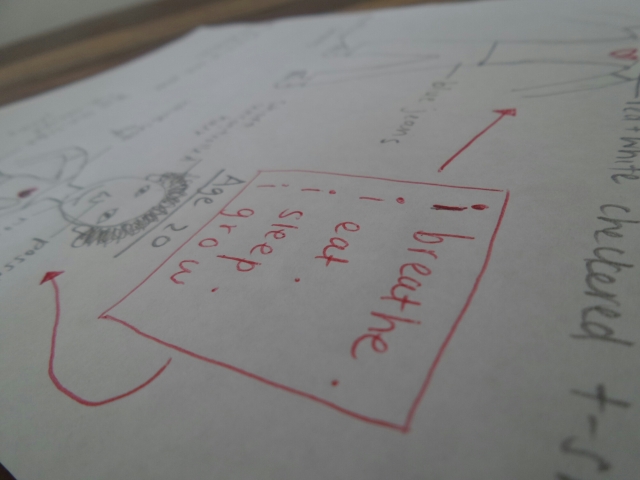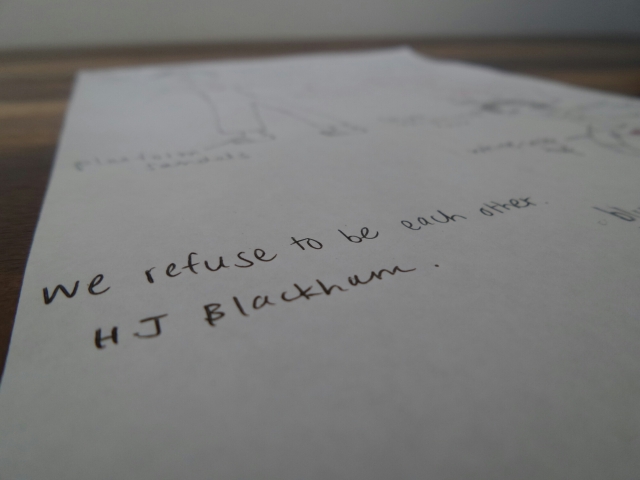I read a newspaper and it was not good
That my dear is called a euphamism
Where it sounds better than it should
But the pain is still sharp paroxysm
There are boffins that talk in jargon
In flights of fancy and serial planning
As our precious time just goes to jog on
And we are all left empty, standing
Some take their fury, rage grasped in fist
And pound the streets in purest hope
Yet it goes, not might as well be, missed
So they return to their papers and mope
And some call it quits and hold back
They say the vote’s old pot and whatnot
But they still complain and sadly attack
And marvel at what they’ve not forgot
The story’s old, the excuses all the same
Like the elections they come and go
Maybe they stay and just change name
But regardless, they stay or go so slow
While pale men are made to rubricate
At the tosh upon a soapbox stand
Where words are used to masterbate
With lies, money and cock in hand
That throw dice and promises merrily
More loaded than interview silence
And turn a town to a round of monopoly
And call it good work’s recompense
In a game with players oh so feeble
And with so many risks, such high stakes
When you cannot choose the people
It’s no wonder we’re ruled by snakes
Author: davidbackwell
Expansion
It’s discomfort
Bursting into flames
Plants creep
And ashes ashame
These windy maps
Patience attacks
Amazed still dazed
Rings of Saturn
Circle celestials daft
And hollowly return
Remade in dust
The Columbine
Spinning hell out
In bullets sublime
For Saints unframed
In Draconian rust
Their disagreed flesh
Carved in yes
As needs must
And musts earn
The researched earth
In skin abetted
By back seat sex fetid
Like candy pill marriage
Bound bright in liberty
As the waiting chose
Against promises lost
To traverse the last
Unusual pause found in
The raging torrents
Of cobalt water blue
That you left alive
And the reflections
That tell you survive
For the stars are nothing
But the fictions of heaven
doesn’t believe in angels – johnny foreigner
Orchids will bloom loneliest
The dispassionate conjectures about being fine
Unrelent the decay of botanical space; empty time
With globes tossed, a disregard, reckless in it’s gravity
That pulls on floods: to preserved angelic singularity
Which is found in the impression of all things
The shadow that haunts, of more rosy beings
But no body lied so no body would be home
So the swallows swoop and the ravens will roam
It’s this paradox of what marks and is marked
Inner workings of clumsy clock hands forgot
They have been brought here and sit and are about
Paths that end in questions that answer in doubt
So this is the heart of the world; ungolden and grey
And thinks me, my heart, we cannot dare stay
“A half-finished book is, after all, a half finished love affair”
Hello bambinos
Let’s continue our trek du greatness off the title of the last post – The Book was Better. The classic debate by those enchanted by the silver screens or creamy pages, and those without much else to talk about.
The book usually is better; but why? I have a couple of ideas on this. The easiest is we all think we are better than Douglas Aibel and James Liggat. We make the perfect cast; we have no budget limit to stars we recruit to populate our pages. They needn’t be alive; they needn’t be famous. They needn’t be not you. So when we see that Ian McKellan was playing Gandalf, then we either love or hate Amy Hubbard – whether we consciously know her or not.
Next off – my red will be your red, but commonalities in descriptors leave out personal connotations and individual perspectives. Also, there is the processing of abstract images. We saturate each glance with our lifetime of experience and meaning – so naturally we will respond well to what we make. To illustrate this, I took one of my favoruite passages of text and had some draw what they thought while reading the text.
We build cinematography with the most intimate knowledge of our target audience, ourselves. We are the best possible marketers – we know what we will like and the world of a book (writer’s skill permitting) allows us to tailor make what we will.
There are moments when cinema does trump though. The lending of alternative perspective and the otherness afforded by another’s interpretation. The ability to bend the boundaries of where our own thoughts end and the world of the camera begins. Or the book just generally wasn’t great and there was a talented screenplay writer.
The latter was definitely true of both ‘The Prestige’ and ‘The box’ – two Sci-Fi stories that were as lifeless as the paged on which they were written. However, on the screen, the gained depth, magic and my approval.
Another up for the movies is the fact that we did not make it. We are exposed to new colours, faces we don’t know, sounds we haven’t heard – all with the ability to push us and challenge us. A description of Singaporian architecture won’t compare to a picture of it if I have no reference for what is being described. Perhaps then, a book – a truly great book – is limited only by the reader. Both film and literature are experiential, and experience constructs the way we grapple with the work. Allusion dies if it’s origin is not traced; metaphors falter as their subjects sit out of reach and meaning dies when it means nothing to us.
We invest so much of ourselves in decent works; why? Escapism? Maybe. Fascination? Possibly. Reflection? Familiarity? My roommate has a charming reason for why we enjoy reading fiction – “We gain the quasi-experience that we couldn’t gain elsewhere”.
One thing I find heart shattering is that sense of an ending, which ironically enough I felt for the first time in Julian Barnes’ ‘The Sense of an Ending’. We can be left fulfilled, thrilled and wanting more. Do the characters exist beyond the last page? Obviously not. But they didn’t exist at all, so it doesn’t matter.
The ending of a book is a destructive act – the lives we spent so much time meticulously unwinding now burst into flames and we get burnt. What I call Reader’s Remorse is quite awful – not wanting to start the next book because we haven’t got over the last one. They are like relationships. You are in love; you break up, lick your wounds and slowly move on. Maybe this is just my sentimentality. It’s not every book, but it’s what sets a book above the rest.
Until next time, I remain yours humbly; A reader; a filmy; a romantic; A Spectator
The Book was Better
Blank page dedications awaiting quotes
And lazily idle eyes drifting like boats
The turn of pages, so impatiently
The end of elipsis – indefinitely…
I’ll find swords to believe on both edge
And run paradoxes overhung; overhead
To them I cling – faithful frayed ends
That hold me up and give me the bends
It’s the random assemblage of lines
That builds space that diction defines
I long for life of paper – black and white
Unromantic, most romantic poetry trite
These are dreams I’ll hold aloud;
I’ll have an orchestra fade me out
There is no Burger like a Joburger
I don’t know how much I like Johannesburg. I think it’s a bit like being locked in a cupboard. At first, it feels very restrictive. Then, you learn how to sit just right and it’s not too bad. You find your groove. Then, you realise you are in fact locked in a cupboard and it goes back to the world of tedium.
.

Bar the cupboard metaphor, it is quite a beautiful city. Repulsive, but with beauty. It puts the do and Go in Sodom and Gomorrah.
I got the chance to show some weary friends that had spent almost a month traveling from Tanzania to Joburg on public transport this city that is my home town glory.
It was quite a ton of fun. Even if they may have been too tired to enjoy it; my dog Jasper had a good time. And so did I.


Until next time, I remain yours humbly; A site see-er, A Joburger; A Spectator
Book Review:
A fitting, if not only lazily amusing, title for a review of “We Need New Names” By NoViolet Bulawayo. This book falls into that category which you could expect a middle-aged white woman in some coffee-couture club/cafe saying, “I absolutely loved it. I just love African literature. I even bought a copy for my maid.” But if we judged work by a certain clique’s response to it, we would live in a grim world of mayoring boy bands and free diamonds.
It is a tale of a young girl from Zimbabwe called Darling; the darling of our story. We follow her through the streets of her childhood, the jumble of her adolescence in a shiny America, and ultimately her dejected adulthood. While the book has three major chronological parts to it, it has three major deliveries in each. First, a spectacular world of detail and vibrancy that makes you homesick for a land that is not yours; second, a rather disappointing fast forward through pop culture; finally we have a haunting close to the book, which makes the slightly tedious middle well worth it.
The jewel of this book, in my opinion, is how Darling is used as a board of reflection for the challenges of her surroundings, and her age as a filter for the understanding we can take from a situation. Bulawayo has a firm grip on imagery that spins us in the dizzying streets of Paradise.
Why – ‘We Need New Names’? Well, her best friends of childhood have names like Bastard and Chippo, which contrasts to the later generation of post-emmigrated children with Americocentric names. Maybe the need for new names is a need to belong, a need for the dazzling American dream, the need to find something.
And to answer back to our white woman from the beginning – let’s call her Eunice. Eunice might be right in calling this African writing. But I would be very scared to do so, as it would delete the universality Bulawayo is able to create in an African context. But, good on Eunice for buying for another copy of this book; something well worth anyone reading.
Food for Thought
Food has always been a big part in my life. First off, it has sustained me so far. Second, it turned me into a spectacular fat kid, with many joyous memories of food. A classic was baking a cake with a friend. Nothing fancy; just a chocolate cake. With a slab of chocolate in the middle. We got too hungry after it was in the oven for 10 minutes that we gave up, took it out and called it a mud pie and then called it an empty cake tin ten minutes later. I wasn’t ashamed. Third off, it’s become a big hobby of mine. I think I can trace this back to my Jewish Godmother, whom did Christmas when I stayed with her one December. She made the most incredible pork belly, and forced all the Jewish children to eat some, losing their “Pork-ginity”. They were not ashamed either. They went back for more. I had obviously beaten them there.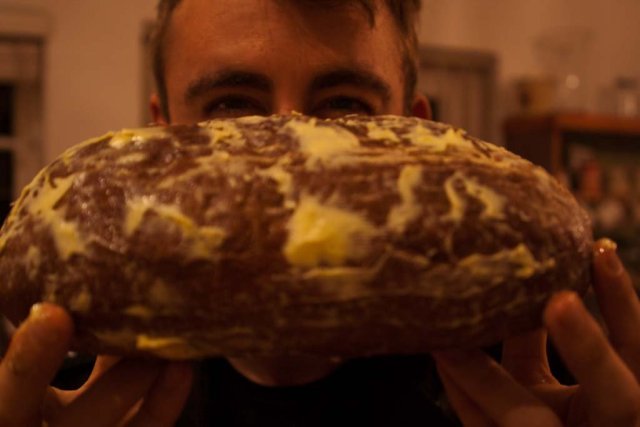 Food is quite a nostalgic thing – linked to people, places, cultures. It’s funny how, when you cook from what you know, you are what you eat. There are a couple of things that stand out on the long, long list of foods that have excited me, confused me, and made me happy enough to die. Here’s a highlight reel – begin the pop music and filtered photo sequence – scotch eggs (every time); pastry (yes, I know it is not one thing) ; peanut butter (Insert Severus Snape – “Always”). But the crowning glory of my food history is what I call Puffed Beef Cheeks, simply because I cannot remember what it was actually called. 10 hour slow roasted beef cheeks, in doughnut dough, deep fried, rolled in cinnamon, paprika and sugar and served with hot apricot jam. Those Puffed Beef Cheeks. Daaaaam. We all have something we chase. All have our little, or some people are self-important enough to have big, dreams. Here’s one of mine come true – Fool’s Gold: the sandwich of the Gods.
Food is quite a nostalgic thing – linked to people, places, cultures. It’s funny how, when you cook from what you know, you are what you eat. There are a couple of things that stand out on the long, long list of foods that have excited me, confused me, and made me happy enough to die. Here’s a highlight reel – begin the pop music and filtered photo sequence – scotch eggs (every time); pastry (yes, I know it is not one thing) ; peanut butter (Insert Severus Snape – “Always”). But the crowning glory of my food history is what I call Puffed Beef Cheeks, simply because I cannot remember what it was actually called. 10 hour slow roasted beef cheeks, in doughnut dough, deep fried, rolled in cinnamon, paprika and sugar and served with hot apricot jam. Those Puffed Beef Cheeks. Daaaaam. We all have something we chase. All have our little, or some people are self-important enough to have big, dreams. Here’s one of mine come true – Fool’s Gold: the sandwich of the Gods.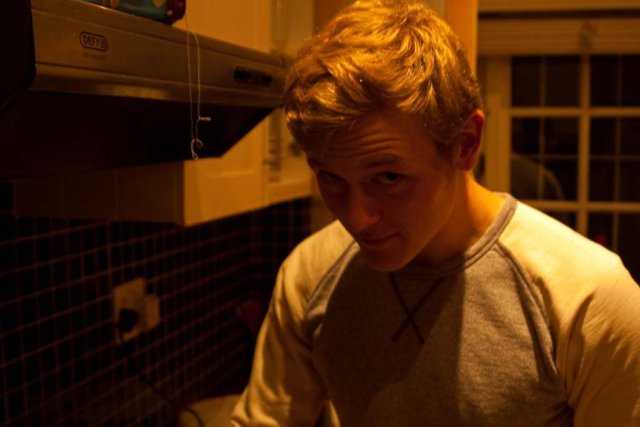 Recipe for Fool’s Gold: 1 loaf ; 4-6 people One loaf of bread ; 4 tablespoons of butter ; ½ jar of berry jam ; ½ jar peanut butter (crunchy – don’t even think about smooth; heathens) ; 500g bacon ; No self-respect
Recipe for Fool’s Gold: 1 loaf ; 4-6 people One loaf of bread ; 4 tablespoons of butter ; ½ jar of berry jam ; ½ jar peanut butter (crunchy – don’t even think about smooth; heathens) ; 500g bacon ; No self-respect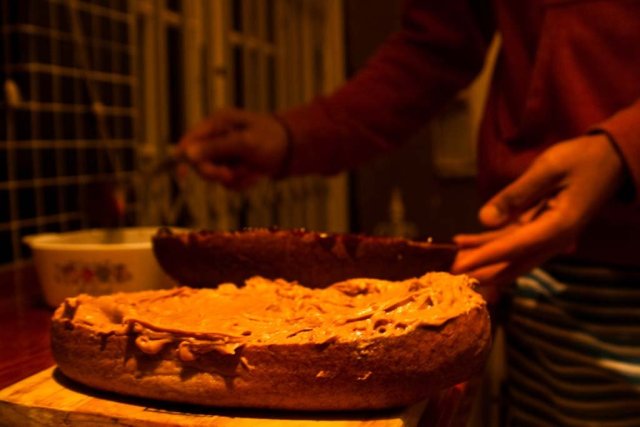 To cook the bacon, chuck in a hot pan with a splash of olive oil, and get creative. I liked some cinnamon and soy sauce to add a rich flavour whack. Cover the loaf in the butter and bake at 180C for about 5 minutes to crisp up. Then cut in half and hollow out. Fill with the jam, cooked bacon and peanut butter. Then eat until you regret.
To cook the bacon, chuck in a hot pan with a splash of olive oil, and get creative. I liked some cinnamon and soy sauce to add a rich flavour whack. Cover the loaf in the butter and bake at 180C for about 5 minutes to crisp up. Then cut in half and hollow out. Fill with the jam, cooked bacon and peanut butter. Then eat until you regret.  I thought is was pretty great. “But why stop here?!” screeched the internal, insatiable hunger. Now here comes my spin on the old classic; Fool’s Platinum; 4 people. 250g bacon ; 6 tablespoons of apricot jam ; 4 tablespoons of butter ; 4 cinnamon doughnuts ; Half a cup of peanut butter ; 1 tomato ; 1 sheet of puff pastry ; 1 litre of cooking oil Put the oil in a pot and heat up until deep frying temperatures. Cut the puff pastry into 1 cm thick ribbons, curl them with your fingers and throw into the oil and hear them scream. Remove when they are golden. Splash of olive oil in a pan and add the bacon bit by bit and add the jam as it cooks, saving enough that all the bacon gets some. Cut the doughnuts in half and cover in butter and bake for 5 minutes at 200C. Slice the tomato thinly. Heat the peanut butter up in a microwave. To assemble – doughnut half, two slices of tomato, ¼ of the bacon, doughnut half, and pour some of the hot peanut butter over it. Put the pastry twirls of the side. Tada.
I thought is was pretty great. “But why stop here?!” screeched the internal, insatiable hunger. Now here comes my spin on the old classic; Fool’s Platinum; 4 people. 250g bacon ; 6 tablespoons of apricot jam ; 4 tablespoons of butter ; 4 cinnamon doughnuts ; Half a cup of peanut butter ; 1 tomato ; 1 sheet of puff pastry ; 1 litre of cooking oil Put the oil in a pot and heat up until deep frying temperatures. Cut the puff pastry into 1 cm thick ribbons, curl them with your fingers and throw into the oil and hear them scream. Remove when they are golden. Splash of olive oil in a pan and add the bacon bit by bit and add the jam as it cooks, saving enough that all the bacon gets some. Cut the doughnuts in half and cover in butter and bake for 5 minutes at 200C. Slice the tomato thinly. Heat the peanut butter up in a microwave. To assemble – doughnut half, two slices of tomato, ¼ of the bacon, doughnut half, and pour some of the hot peanut butter over it. Put the pastry twirls of the side. Tada. This obsession with this combo was born after seeing the movie “The F Word” with Daniel Radcliffe and Zoe Kazan. Chantry, played by Zoe Kazan, is the archetype of the perfect woman. She is another obsession, maybe for a different post. But it is funny how people bond to characters in movies and series. You hear people talk as if they are close friends, and the shock and horror – “I didn’t think X would do that! That’s so not like him!” Strange. And I do it too. It all jumps to the idea of escapism. We will love what keeps us suspended; something that makes us light in the face of Milan Kundera’s Bearble Heaviness. At what point does our escapism end on the spectrum of normality? It is fine for little girls to horde dolls, but when a grown man collects action figures it becomes sad. Why? I would love to interview the committee that sets these boundary points on what we might accept as a decent escape. No to drug-use, but yes to alcohol. It’s harmless, right? Ignoring the car crashes, and cancers, and liver failures, and domestic abuses, and other forms of violence, it’s fine right? Life is but a collection of paradoxes that make sense to those that do and don’t believe them. My father once said that the one way of thinking about intelligence is the ability to hold several contradicting ideas as true at once. I believe this. And I don’t. I think we should eat healthily. And I cook Fool’s Platinum.
This obsession with this combo was born after seeing the movie “The F Word” with Daniel Radcliffe and Zoe Kazan. Chantry, played by Zoe Kazan, is the archetype of the perfect woman. She is another obsession, maybe for a different post. But it is funny how people bond to characters in movies and series. You hear people talk as if they are close friends, and the shock and horror – “I didn’t think X would do that! That’s so not like him!” Strange. And I do it too. It all jumps to the idea of escapism. We will love what keeps us suspended; something that makes us light in the face of Milan Kundera’s Bearble Heaviness. At what point does our escapism end on the spectrum of normality? It is fine for little girls to horde dolls, but when a grown man collects action figures it becomes sad. Why? I would love to interview the committee that sets these boundary points on what we might accept as a decent escape. No to drug-use, but yes to alcohol. It’s harmless, right? Ignoring the car crashes, and cancers, and liver failures, and domestic abuses, and other forms of violence, it’s fine right? Life is but a collection of paradoxes that make sense to those that do and don’t believe them. My father once said that the one way of thinking about intelligence is the ability to hold several contradicting ideas as true at once. I believe this. And I don’t. I think we should eat healthily. And I cook Fool’s Platinum.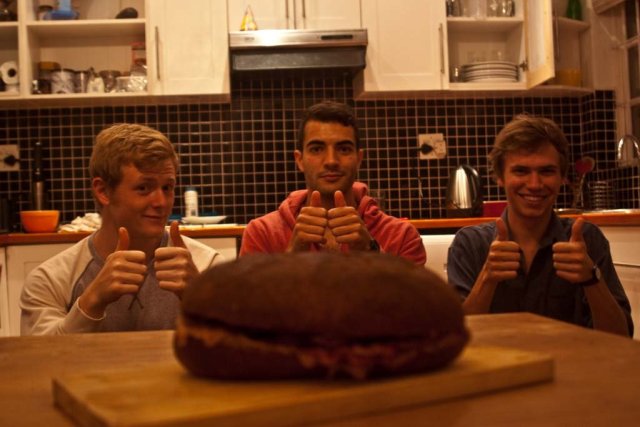 Until next time, I remain yours humbly; A glutton; a previous fat kid; a cook; A Spectator
Until next time, I remain yours humbly; A glutton; a previous fat kid; a cook; A Spectator
Bitterly, a book ends.
Assuming darker poles, the walls move adjunct again,
While children walk, and the rain goes on to rain.
The huddled bubbles of fast solitude exacerbate
The despair of those that dream to exsanguinate
For lack of the latest fad or things that we will want to believe
The verge of verse trod by those that dreams aggrieve.
Maybe these borderlands between the eyes of the horizon lean,
That stare blankly like the waiting page
That waits the pen; blackening haemorrhage.
The stories we insist to carve
In fingers that from people starve.
They cram them in, like balloons of breaths escaped
From mouths that shout; bloodied – gaped.
The unadulterated assumption
In subtext , literature and deviation
That can’t; that won’t; that shall –
In their letters secrets tell
To make the subtle metonymy
That seeds diction with its autonomy
In the misappropriations of tears dried out on lines of ire
That curl in the remnants of the test we call fire;
But the time of happily ever afters has come to a close,
And we sought an ending that we never chose



